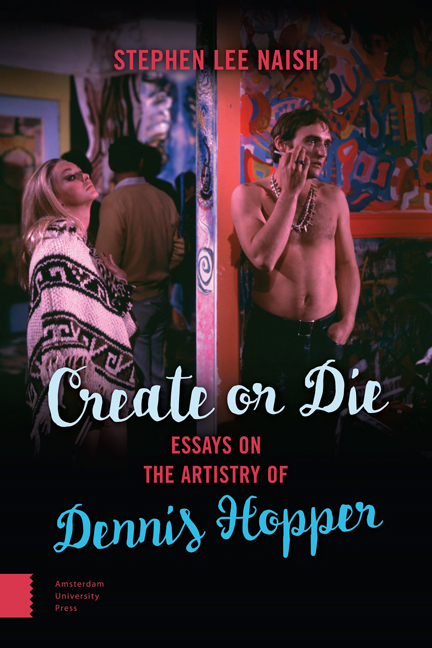Book contents
- Fronmatter
- Dedication
- Contents
- Introduction
- Scenes from a Revolutionary Life: How Dennis Hopper Conquered the American Century
- Hip-Hopp: Dennis Hopper and Music
- The Elephant in the Room: Dennis Hopper and American Politics
- Love and Hate: The Conflict of Emotions in The Blackout and Carried Away
- Commercial Breakdown: Dennis Hopper in the World of Advertisements
- White Light/White Heat: Actor and Character Collide in White Star
- Double Standards: The Art and Photography of Dennis Hopper
- Coda: The Fourth Wall
- Acknowledgements
- Notes
- Bibliography
- Fronmatter
- Dedication
- Contents
- Introduction
- Scenes from a Revolutionary Life: How Dennis Hopper Conquered the American Century
- Hip-Hopp: Dennis Hopper and Music
- The Elephant in the Room: Dennis Hopper and American Politics
- Love and Hate: The Conflict of Emotions in The Blackout and Carried Away
- Commercial Breakdown: Dennis Hopper in the World of Advertisements
- White Light/White Heat: Actor and Character Collide in White Star
- Double Standards: The Art and Photography of Dennis Hopper
- Coda: The Fourth Wall
- Acknowledgements
- Notes
- Bibliography
Summary
Let us consider two important factors, the two poles of the creation of art: the artist on the one hand, and on the other the spectator who later becomes the posterity.
‒ Marcel DuchampThe career of Dennis Hopper was haunted by a single, persistent spectre— that of Frank Booth. Hopper's career and even certain extremes of his life could be seen as a lifetime preparation towards playing Frank Booth, the sadistic menace in director David Lynch's dark and disturbing Blue Velvet (1986). As we shall see throughout this text, Hopper's performances as damaged, deranged, and alienated characters range as far back as Night Tide (1961) and continued up until The River's Edge (1986). The darkness sometimes lay beneath the surface but was persistently present. In Frank Booth, Hopper found the channel for all his previous characters’ rage and alienation. Subsequently, Frank Booth and his exuberant mannerisms would go on to define Hopper's career post-Blue Velvet. The frailties and subtleties of Hopper's pre-Blue Velvet characters were overwhelmed by the Booth-like bluster. The performances in films such as Red Rock West (1991), Super Mario Bros (1993), and Speed (1994) rely heavily on intimidation and menace to communicate their anger towards the world.
My own fascination with the life and work of Dennis Hopper began many years ago during a late night television screening of Blue Velvet. Through a fog of lethargy and a half-drunk bottle of red wine, I was drawn into the opening sequence of white picket fences, cloudless blue skies, and immaculate green lawns. Bobby Vinton's woozy 1963 hit ‘Blue Velvet’ drifted in over the opening images, cosy and hypnotic. A firefighter waves to the camera as he slowly passes by on his red fire truck through the leafy streets of an American suburb. An old man waters his freshly cut lawn, his little dog snoops around the bushes. I was made to feel relatively at ease with the peaceful scene that was unfolding. Suddenly the old man drops to the ground, grasping at his neck in agony. The hose shoots clear water towards the blue sky, which in turn attracts the little dog to lap it up. Then the camera, and also the audience, descends beneath the lawn. Below ground, the insects crawl and scramble over each other in a grotesque close up.
- Type
- Chapter
- Information
- Create or DieEssays on the Artistry of Dennis Hopper, pp. 9 - 14Publisher: Amsterdam University PressPrint publication year: 2016



